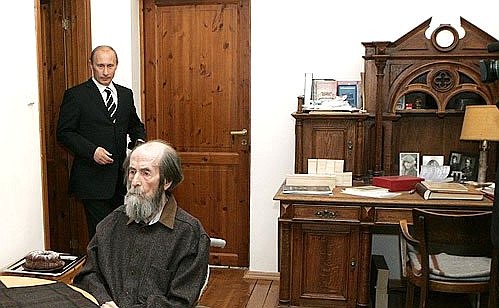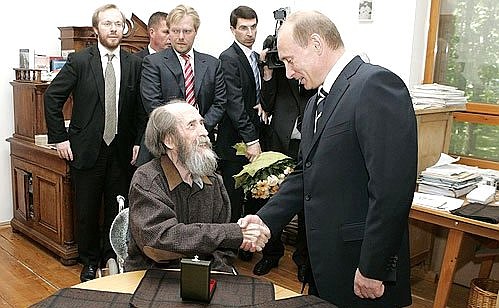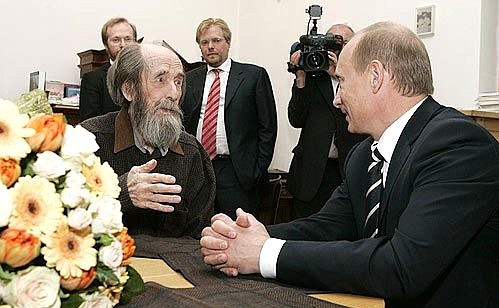Following the ceremony for presenting state decorations Vladimir Putin went to the writer’s home.
The President congratulated Aleksandr Solzhenitsyn on receiving a state decoration and thanked him for agreeing to meet.
The head of state thanked Aleksandr Solzhenitsyn for his work and dedication to improving Russia. Vladimir Putin said that “even today as you continue your activities you never compromise your principles. And you abide by these principles in your own life”.
Vladimir Putin and Aleksandr and Natalia Solzhenitsyn continued their discussion without any media presence.
Aleksandr Solzhenitsyn won the 2006 Russian Federation state decoration for outstanding achievements in the cultural and educational spheres.
After the meeting Vladimir Putin said that he had spoken to Aleksandr Solzhenitsyn about Russia’s present situation and about the country’s future. Vladimir Putin drew the writer’s attention to some policies being implemented today that are to a large extent harmonious with Solzhenitsyn’s writings. The President emphasised that Aleksandr Solzhenitsyn immediately drew attention to the fact that today there are more and more opportunities available for municipalities and local self-government. Vladimir Putin remarked that the writer has always been in favour of such measures. In addition, Aleksandr Solzhenitsyn placed special emphasis on support for medium and small businesses and for the middle class.
According to Vladimir Putin, Aleksandr Solzhenitsyn was interested in the way the President allocates his time to domestic and foreign policy issues. Vladimir Putin said that Aleksandr Solzhenitsyn was surprised to hear that Mr Putin spends 70 percent of his time on domestic issues and only 30 percent on foreign policy issues, in other words international issues that are directly linked with Russia’s interests.
Aleksandr Solzhenitsyn is famous in Russia and throughout the world both as a writer and a major historian. His works on critical phases of Russian history have influenced the development of world historiography. He was a pioneer in important fields such as historical anthropology and cultural studies. Solzhenitsyn’s main work, Gulag Archipelago, was the first record of one of the tragedies of the Soviet period. The author presented this phenomenon as an embodiment of the totalitarian systems of the 20th century. Writing this work was the first step towards gathering the recollections and testimonies of former prisoners within a single record, and therefore conducting a specific type of historical research. The Red Wheel, Solzhenitsyn’s multiple volume work, has had significant resonance in Russian and world historiography. The Russia Abroad Foundation Library was established at Solzhenitsyn’s initiative and holds more than 50,000 works. The writer gave this library more than 1,500 books, including the memoirs of Russian emigrants, collections of their letters, manuscripts on the activities of Russian emigration, and the archives of the head commander of the Russian army in the First World War.
The writer did not attend the awards ceremony at the Kremlin today for health reasons and his wife, Natalia Solzhenitsyn, was there on his behalf. A video of Aleksandr Solzhenitsyn was shown at the ceremony.


